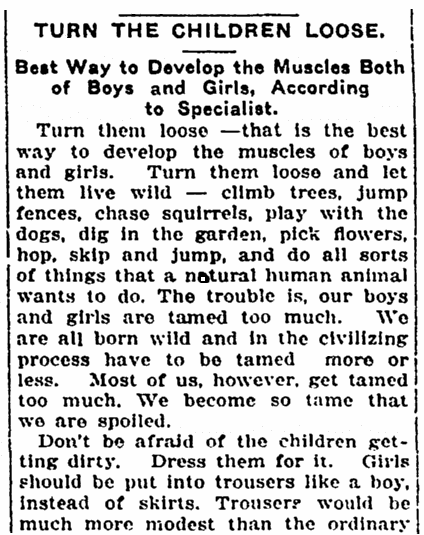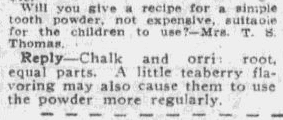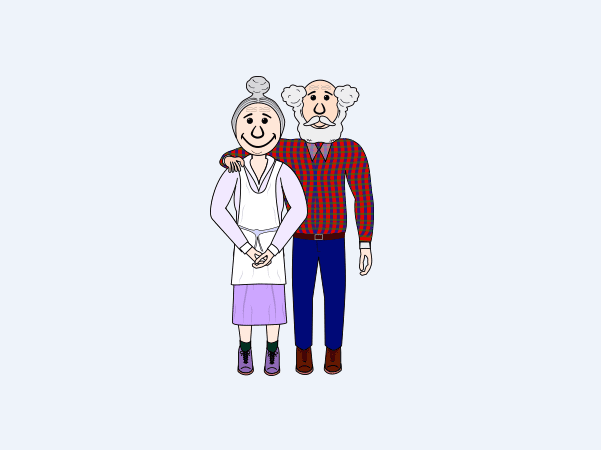Introduction: Mary Harrell-Sesniak is a genealogist, author and editor with a strong technology background. In this blog article, Mary searches old newspapers for glimpses into the lives our ancestors lived 100 years ago.
Sometimes advice columnists and Grandma & Grandpa knew best, but not always. So as we say goodbye to 2015, I thought it would be fun to take a look back at life 100 years ago through newspaper archives. You can be the judge as to whether this advice from 1915 still holds true today.
On Children
Turn children loose, as the following newspaper article suggests, because “we are all born wild and in the civilizing process have to be tamed more or less.” The article explains:
Turn them loose and let them live wild – climb trees, jump fences, chase squirrels, play with the dogs, dig in the garden, pick flowers, hop, skip and jump, and do all sorts of things that a natural human animal wants to do.
Sounds like reasonable advice, even by today’s standards.

Mrs. T. S. Thomas of Boston, Massachusetts, wanted advice on a tooth paste suitable for children and she was told to make a paste of chalk and orri root with a little teaberry flavoring.

Some lucky parents, such as those in Colorado Springs, Colorado, lived where there were dental clinics for children.
On Corsets
Do girls of today know what a corset is, much less how constricting and uncomfortable they are? Often advertised in 1915 as free-breathing and welcoming to women, in truth they were quite uncomfortable.
Edna Kent Forbes wrote in her “Beauty Chats” column that “if we had perfectly developed bodies…the best advice would be never to put ourselves into these harnesses” – but, if lacking bodily perfection, she recommends exercise.
On Driving
Henry Ford really did change the world. Roadsters and racing cars were very much in vogue in 1915.
However, there were issues caused by the introduction of automobiles: lack of consistent driving rules for one, and tires that had to maneuver over rough surfaces. This newspaper article advises that if you ever come across some broken stone while driving, you might want to “take a short run at it – not too fast – and let the car coast over the stone with the clutch out.” This approach “adds just a little more to the life of the tires.”
On Hair Care
Ah, the fortunes spent on hair care! In 1915, you could take care of ugly hairy growths on your skin by making a paste of water with powdered delatone. Apparently there were knockoffs sold which should be avoided. This newspaper article suggests: “You will not be disappointed with this treatment, providing you get real delatone.”
If your hair was falling out, you were encouraged to avoid dandruff which caused hair roots to shrink and loosen. The cure was to purchase a “25-cent bottle of Danderine at any drug store, pour a little in your hand and rub well into the scalp.”
Danderine was the basis for a lethal chemical formulation also known as Spanish Fly. See: http://comstockhousehistory.blogspot.com/2009/06/danderine-heavy-price-of-lustrous-hair.html
Also visit the National Museum of American History website at: http://americanhistory.si.edu/collections/search/object/nmah_716473
If you didn’t like the color of your hair, you could always try sage tea dandy which was great for grey and lackluster hair, according to this next newspaper article.
Can’t imagine trying it though. One has to wonder if sage was enough to mask the sulphur stench, much less protect one from scalp damage or a lethal fire.
On Tipping
Mary O’Connor Newell wrote an interesting advice article in 1915 on getting good tips. She felt that women guests should be showered with attention because: “if they tip at all, they tip handsomely.” In addition, “never neglect a tightwad because he is a tightwad. Shame him with faultless service.” You might also do well to assist newlyweds because “newly wed men love to make a splurge before their wives.”
On Women Who Earn More than Their Husbands
Columnist Peggy Quincy wrote: “My advice to Mrs. S. A. I., who is earning more than her husband, is to stop earning, at once.”
Should men and women of today be thankful they weren’t alive in 1915? Wonder how our descendants in 2115will feel about us when they look back at newspaper articles detailing life in 2015?
